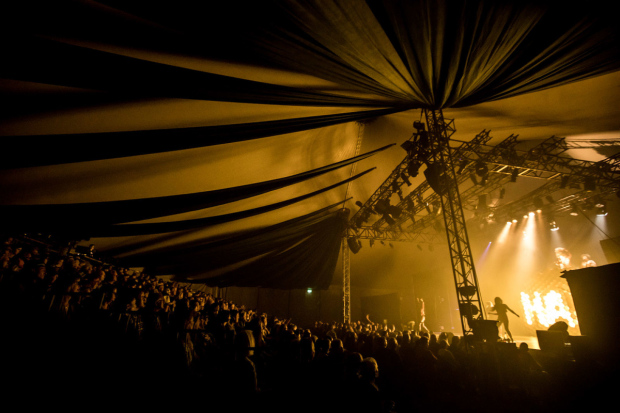Theatre needs to go to the people – and other lessons from Latitude Festival
Matt Trueman reflects on a weekend at this cross-arts festival in Suffolk

© Victor Frankowski
I spent a lot of Latitude Festival watching music. Given the preponderance of Edinburgh previews on the line-up, off-limits to critics ahead of August unveilings, and a raft of shows I’d already seen, I found myself in far-flung corners of Henham Park instead.
There were The Lemon Twigs gawking out like a millennial Spinal Tap in the BBC Music tent. There was this summer’s Scandi pop sensation Sigrid and her perfect ponytail sending soaring vocals through the woods. There were Glass Animals up on the main stage, jaunty and jelly-legged. Electro-pop duo Sylvan Esso. Vanity project Youngr. Indie lads Two Door Cinema Club. And, yes, I’m not too cool to admit it, Mumford and Sons.
It proved an instructive experience – a way of shaking up how I saw the festival. Instead of orbiting around the Theatre Tent, ducking in and out of the performative bits and pieces dotted around it, I found myself ranging further afield – artistically as well as geographically. I popped into a Prince tribute party Marcus Brigstocke was hosting, then a grime gig heaving with topless teenage boys. I caught bands I’d never heard of, and comedians I’d seen on the telly. It was a weekend on shuffle: a pick’n’mix festival.
I know one person who’s only experience of the theatre tent consisted of throwing up their dinner round the back of it
That’s exactly how a cross-arts festival should be, but does it really work like that in practice? I’m not entirely convinced. I’ve certainly spent festivals glued to the theatre listings in the past, but equally I know one person who’s only experience of the theatre tent consisted of throwing up their rushed mac’n’cheese dinner round the back of it.
From those music stages, Latitude’s theatre line-up suddenly seemed rather peripheral; its presence at risk of not even registering. It’s still all too easy for people to stick to their personal patches. Music fans meander round various music stages, spoilt for choice. Ravers come out after sundown. Comedy fans park their picnic rugs in the large comedy stage.
So how do organisers cross-pollinate art-forms? Latitude does dance well: a big public stage in the middle of the lake is visible to passers by. FUEL did something similar years ago with Electric Hotel – its set, a stack of shipping containers, worked like a beacon that drew in an audience from all over the field. A big public spectacle, it rivalled the main stage headliners for impact.
Shocking as it may seem to us theatre obsessives, most people don’t engage with theatre
By contrast, Latitude’s theatre line-up – performance art in particular – has tended to be tucked away to one side in the Faraway Forest. The risk is that you can’t see the work for the trees.
It’s one of the reasons why producer Tania Harrison mixed things up this year. You could find leftfield theatremakers like Bertrand Lesca and Nasi Voutsas in the cabaret tent, while Dan Bye wound up in what used to be the literary salon, the Speakeasy. It cut both ways: the American singer-songwriter Stew and his band the Negro Problem played their conceptual gig in the theatre tent.
Better still are those moments that create their own space, pushing beyond arbitrary delineations. The Arbonauts choir process through the forest in yellow gowns and plastic macs – a strange, almost alien presence – picking up followers as they go. By the time they launch into an impromptu birdsong chorus, they’re catching people off-guard and unawares.
The thing is all of this applies in real life as well. Shocking as it may seem to us theatre obsessives, particularly us critics that organise our lives around opening nights, most people don’t engage with theatre. In our age of echo chambers and entrenched ideas, it’s worth keeping that in mind. Forget that and not only are we kidding ourselves, we’re nestling into our comfortable little niches.
No matter how many times we roll out that stat about theatregoers outnumbering people that go to Premier League football matches; no matter how much we stress the theatre’s place at the heart of public politics and national debate; theatre is easily overlooked. To change that, it has to reach out of its silos.













